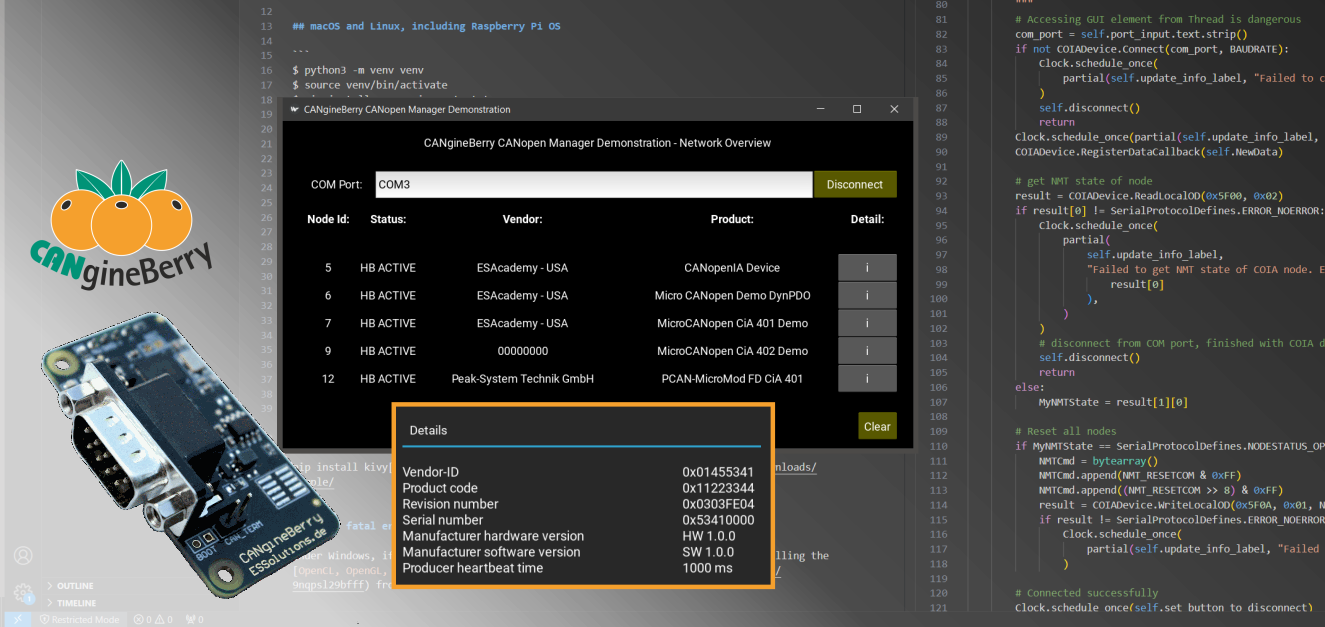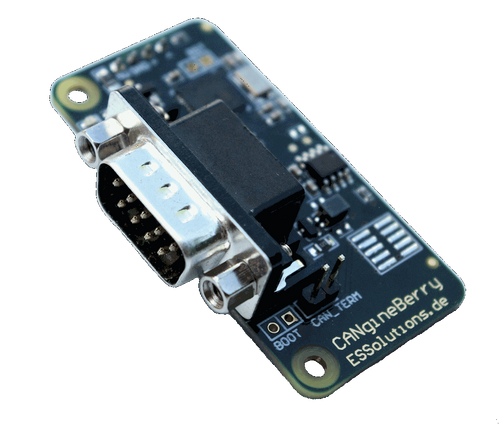Blog
Recent Posts
Python Code Example for CANgineBerry’s CANopen Manager
Posted by on
 Embedded Systems Academy has released a new software update for the CANgineBerry. This update includes a Python example designed to streamline network management for developers using Linux, Windows, and macOS. The example utilizes the provided CANopen Manager firmware to visualize and efficiently manage devices on a CANopen network.
Embedded Systems Academy has released a new software update for the CANgineBerry. This update includes a Python example designed to streamline network management for developers using Linux, Windows, and macOS. The example utilizes the provided CANopen Manager firmware to visualize and efficiently manage devices on a CANopen network.
The CANgineBerry goes beyond basic CAN interfaces by handling the complete CANopen Manager functionality. This means the module can automatically scan the network, detect new devices, and set up the necessary Process Data Objects (PDOs) without manual intervention. With this automated feature, users can easily access the Object Dictionary entries for the Manager and the connected devices, eliminating the need to write complex code.
The Python example demonstrates these features using a simple graphical user interface (GUI). When connected to a CANgineBerry, the script accesses detected devices, retrieves their details as needed, and presents them in an easy-to-understand display. This tool allows quick access to multiple devices on your CANopen network, whether yoing Linux, macOS, or Windows.
By Developers can focus on higher-level application development by delegating low-level CANopen management tasks to the CANgineBerryhe Python-based GUI, which makes configuring and monitoring CANopen networks easy and provides instant control over devices.
This update strengthens CANgineBerry’s position as more than a CAN bus interface. It remains a robust solution that simplifies CANopen network management, offering flexibility and user-friendliness for embedded systems developers.
To download the example, go to: https://cangineberry.com/
 CANgineBerry - CANopen Module for Raspberry Pi
CANgineBerry - CANopen Module for Raspberry Pi
The CANgineBerry for CANopen is an active CAN Bus co-processor module that uses a regular UART communication channel toward the host system. With its independent 32-bit microcontroller, the CANgineBerry can efficiently execute CAN Bus protocols with challenging timing demands, such as CANcrypt or CANopen, with response times of under 10 ms.
Depending on the configuration, the CAN Bus communication can run within 50 ms after power-on, even if the host system takes significantly longer to boot. More information...
Discover the Basics of the Raspberry Pi Along with Projects
The Raspberry Pi Starter Kit includes the Raspberry Pi 4 8GB Model B with a 1.5GHz 64-bit quad-core CPU and 8GB of RAM. The case is equipped with a super quiet 40mm PWM fan and four heat sinks to ensure good heat dissipation for the Raspberry Pi. Additionally, it comes with a 5V 3.6A Type [...]
Raspberry Pi Pico CAN Bus System with Micro-Python Installed
The Raspberry Pi PicoBoard is an inexpensive and versatile development board designed for the RP2040 microcontroller chip developed by Raspberry Pi. It features an RP2040 microcontroller chip with 2MB of Flash, and a micro-USB port for power, data, and programming. The 40-pin dip-style header provides 26 multi-function 3.3V GPIO, 23 digital-only GPIO, and three ADC-compatible [...]
Linux Development Board, Integrates ARM Cortex-A7 Processors
The LuckFox Pico represents a cost-effective Linux micro development board based on the Rockship RV1103 chip, which supplies a straightforward and efficient development platform for embedded system designers. It supports a variety of interfaces, including MIPI CSI, GPIO, UART, SPI, I2C, USB, and more. Developing applications is convenient, and debugging is quick.Features The single-core ARM Cortex-A7 [...]
Dual CAN PCIe Card for Industrial, Automotive Applications
Cervoz Technology, a supplier of embedded components for the industrial PC market, has extended its industrial modular expansion cards line with the MEC-CAN-2802i, which provides two isolated CAN CC (Classical CAN) interfaces. The expansion card delivers a cost-effective solution for integrating CAN CC ports into embedded computer systems, especially in hostile environments. The board incorporates an M.2 [...]
Automotive Development Module has CAN FD, LIN, Ethernet Port
Renesas has launched a software development board featuring the R-Car S4 System-on-Chip (SoC). The scope of delivery includes the Whitebox SDK open-source software. The R-Car S4 facilitates the launch of Car Server/CoGW with high performance, high-speed networking, high security, and high functional safety levels required as E/E architectures grow into domains and zones. The R-Car S4 solution [...]
PCIe Board with 4-Port Isolated CAN FD for Applications
Sunix (Taiwan) manufactures CAN (FD) interface cards for commercial, agricultural, military, government, recreational, and other industries. Their recently introduced CAN4F00SI PCIe card offers four isolated CAN FD ports. The interface cards can self-diagnose and repair data errors to meet the demand for accurate UAV (Unmanned Aerial Vehicle) control in mission-critical applications. The mission computers, autopilot computers, actuators, [...]
Raspberry Pi Compute Module With CAN FD for Automation and IoT Applications
Kontron announced the release of their Pi-Tron CM4 computer with Linux OS, which utilizes the fourth-generation Raspberry Pi compute module with the 1,5-GHz, 64-bit Broadcom BCM2711 chip and four Arm Cortex-A72 processors. The computer’s steel housing allows for universal use, e.g., for automation and IoT (Internet of Things) applications. Depending on the variant, it provides a 1-GiB, 2-GB, [...]
Fast-Boot Your Raspberry Pi 3 Linux In Under Two seconds
Raspberry Pi enthusiasts are looking for a way to fast boot a Raspberry Pi mini-PC. They may be interested in a new project available via Github. The project describes the fast booting of a Raspberry Pi 32 Linux in under two seconds. Check out the video link below to demonstrate how quickly you can [...]
Industrial PC Based On Raspberry Pi Platform Supports A Broad Range Of Connectivity Options And Functions
The Revolution Pi series, from KUNBUS GmbH, is a cost-effective industrial PC based on the well-established Raspberry Pi platform. The RevPi series, for short, represents controllers composed of open hardware and software, meeting the EN 61131-2 standard. The operating system is a specially adapted Raspbian version with an RT patch. The RevPi Compact from KUNBUS is a [...]
 Loading... Please wait...
Loading... Please wait...
